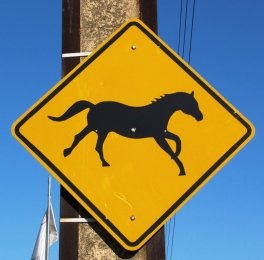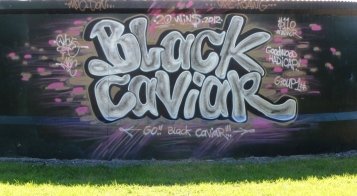Morphettville Racecourse is the last remaining horse racing course in metropolitan Adelaide. It’s on the northern boundary of the Marion council area, surrounded by stables and houses. There are a number of ways it contributes to the cultural heritage of the area. The races of course. And the fact that the 1913 grandstand is on the SA Heritage Register. But it is also a large green space, with a wetland, in a suburb. Stable owners leave bags of horse manure outside for people to take for their gardens. In fact, you can even turn up with a shovel and take it yourself if you wish – horseshoes turn up frequently.

Road sign near Morphettville racecourse
On 12 May this year, when Black Caviar won her 21st consecutive race at 4.20pm, making a new Australian record, there was a sell-out crowd of 30,000 at the racecourse. As well as the paying crowd inside the course, a group of people numbering about 150 gathered at the perimeter fence at the rear of the racecourse near the starting point – all ages, and arriving mainly on foot from the surrounding houses.
As the horses rode up to the starting boxes, there was a great deal of murmuring to children about Black Caviar, and some queries between strangers about which horse exactly she was. The starting gun fired, the horses raced off and the crowd dispersed … as far as the nearby traffic management van where the two workers had increased the volume on their radio so that the crowd could hear the race. Black Caviar won, everybody clapped, and nodded and smiled at each other, and then went back to whatever they were doing beforehand.
Tangible and intangible heritage – I’ve been pondering on this for the past couple of months, and how their combination helps to defines cultural significance. The grandstand, the racecourse, the horse manure – all tangible items (although the manure is also ephemeral). The experience of Black Caviar is a shared intangible experience – we can’t re-create it, or experience it again, we can only remember it. And in saying that, a week after the race I came across one graffiti artist’s endeavour at capturing the essence of the moment, on a water tank at the rear of the racecourse, and successfully blending the intangible memory and the tangible expression of contemporary art.

Black Caviar graffiti on water tank at rear of Morphettville racecourse
Susan Arthure


Great post Susan! Uncommissioned graffiti really is a great way to eternalise memories, particularly events such as this. Hopefully it isn’t removed- I’m guessing that due to its significance (particularly to the area) that it might move from being considered ‘uncommissioned’ to ‘commissioned’ graffiti and consequently be preserved.
Thanks Jordan. Yes, I liked the words around the main Black Caviar caption as well, which provided more detail about the event. And it does liven up a particularly uninteresting part of the road!
I wonder if there is a connection between our faux Depression and these freak horses. The link to Phar Lap is a conscious return to an age of freak success in a time of terrible travail. And beyiond that, the sense of foreboding as Balack Caviar flew off to foreign shores to face who knows what malevolence. All our innocence tied up in this wonderbeast; all our evil offshore
Wonderfully written Susan; really enjoyed it, from someone who grew up and went to school close by ; had school buddies whose parents were involved in the local horse industry; and wonderful memories of walking to the track and watching the races with my grandmother, then as a uni student working at the tote there – and now live back in the area again. Amazing that we still have such a green space in the middle of the ‘burbs! Amazing horse – wonderful but heart stopping to watch that race at Ascot and to think that he had been at local Morphettville only a couple of months before! Kerry H
Interesting point Ron. And great memories Kerry. Thanks for commenting.